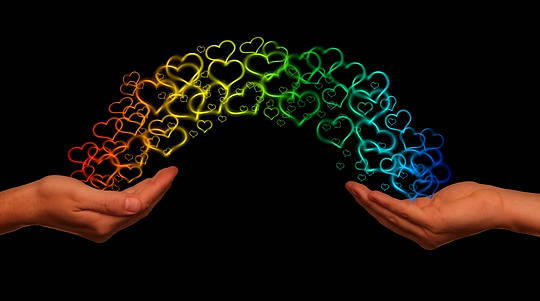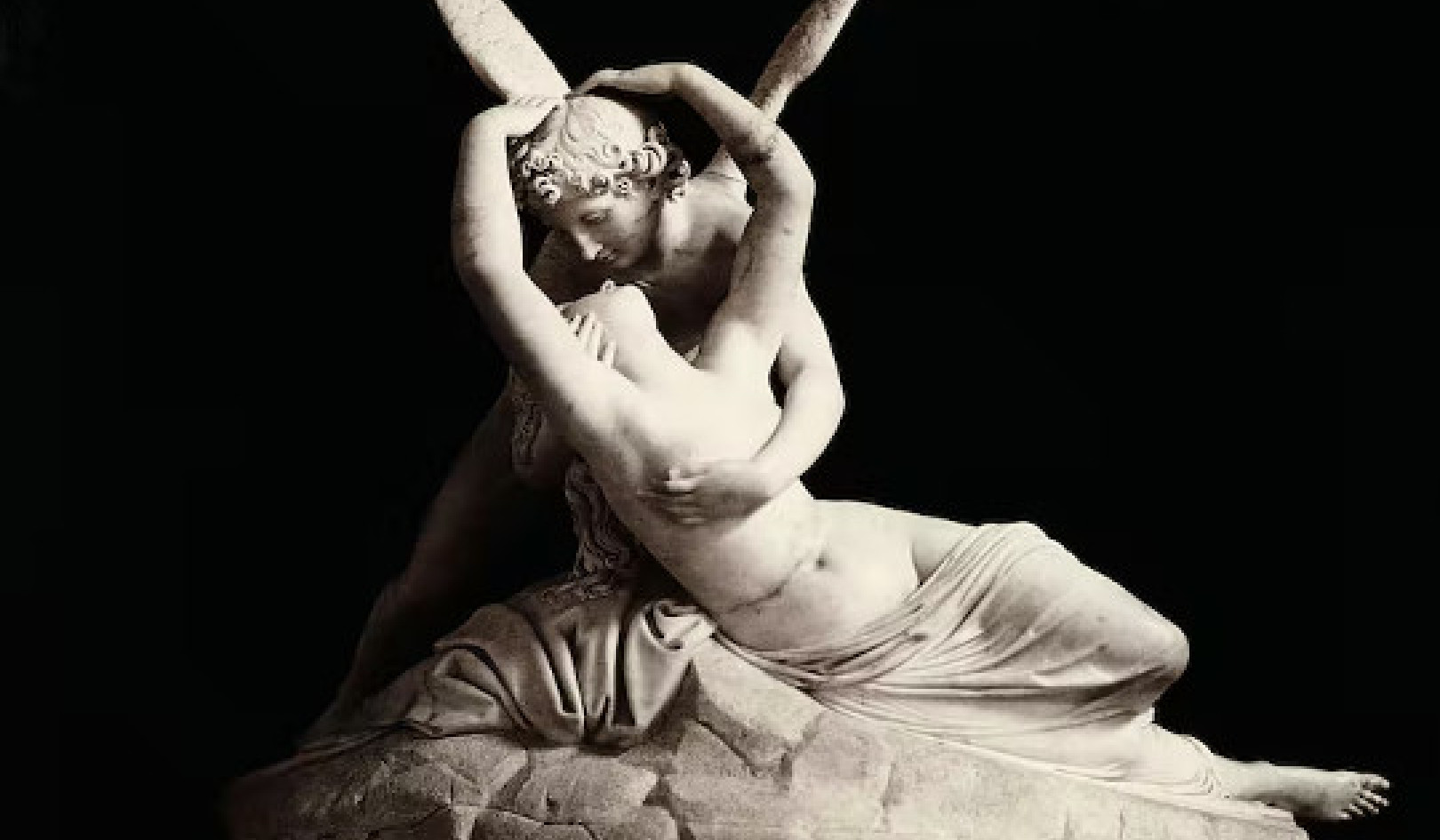
Image by Gerd Altmann
Tantra is well regarded within the yoga tradition as the fastest path to enlightenment. Eastern legend holds that an average human soul takes 100,000 lifetimes to achieve enlightenment, but that with tantra, any person truly committed to this path can gain enlightenment in as little as one lifetime.
I soon discovered why this is true. It has to do with the amount of energy available to us.
During tantra we are able to use both our own energy and that of our partner. The total energy produced is much greater than the sum of its parts. Energy incites change. The more energy we have, the faster the rate of change. When we combine the energy of two people toward a common purpose, spiritual development accelerates at an exponential rate.
Your Tantric Partner Becomes Your Teacher
Many students of God acknowledge a teacher who serves as their inspiration in this physical world. To Hasidic Jews this person is the rebbe. In Catholicism it is a priest or the pope. Your tantric partner will become your teacher and you will become his.
Some partners are at the same level of conscious spiritual evolvement. Sometimes there is one dominant teacher. My partner had a far greater level of emotional evolvement than I, and he was also much better at containing and directing tantric energy.
For the most part I consider him my teacher, even though in tantric practice I was initiating the various positions and meditations. But sometimes I would teach him some things. (You cannot teach without learning, they say.) It was touching to me that this strong, accomplished tantric teacher could also be so vulnerable. It made him more approachable to me.
Becoming Very Dependent On Each Other
Tantric partners share such a strong bond that in some ways they become very dependent on each other. This might seem a contradiction to the concept of personal responsibility. But mutual dependence does not mean giving up control of our lives. It actually means the opposite; it means each of you takes responsibility for the other. It means letting our partners into our hearts. We do not give up anything; we add to what we already have.
Within a tantric partnersnip, each person becomes reliant on the sexual and spiritual skills of the other. Our partners must be capable of great empathy and oneness, so that they can understand our emotional, physical, and spiritual rhythms. Furthermore, our partners must understand us so deeply that they know our potential, the perfection of what we can become. Paramount is the need for another.
The Need For Another
As much as I enjoyed my tantric partner's company and respected his knowledge and experience, I did not like the idea of relying on anyone at all. My independence set me apart. It made me who I am. An individualist! A pioneer! A lover of personal freedom. Autonomy was my sole comfort zone. Yet to follow a path of tantra, I -- a prodigal loner -- must choose to rely on someone else for my personal spiritual pursuits.
Well, that's inconvenient, I grumbled to myself. After all, my spiritual path is between God and me. Why bother depending on someone? It would be a lot easier just to take this information and use it by myself. I had it in the back of my mind that I could do tantra differently. Sure, tantra requires a partner, except in my case, that is. I'm told that this is a common feeling with new students. But could I get over it?
There is no place within the human spirit more vulnerable than the heart. The heart is where we feel the deepest pain. We summon our greatest strength from the heart. In tantra the hardest step -- allowing another person into the heart in deep trust and oneness -- will bring the greatest reward.
Defensiveness Was My Armor Against Pain... and Love
When I looked more deeply at my aversion to this idea, I realized it was not my independence or freedom I was afraid of losing: I was afraid of being hurt by others. A protective wall covering my heart kept me safe. Defensiveness was my armor against pain. Any child raised in an unhappy family knows what hurt is all about. We learn that relationships are painful, that they lead to separation even when we have the best of intentions.
My earliest memories of relationships were of struggle and sorrow. Brothers betraying my trust, sisters rejecting me, a mother in too much pain to pay me enough attention, a father not understanding. As a sensitive child, I took all of this deeply to heart, and as an adult I was still not eager to show my vulnerability. So much of my past was unconsciously running my life.
Ultimately, my fear of being hurt had nothing to do with anyone outside of me. It had nothing to do with siblings, parents, or friends. I was weighed down by painful memories as though they were stronger than I. But, in fact, the protective barriers I placed in front of my heart kept me from experiencing love. The walls did not protect me; they prevented me from knowing who I am. They kept me from giving and receiving the love and joy my true nature yearned for.
The heart is so vast! How are we to contain such a wild part of ourselves? My heart was a place within my soul that I didn't really know, and I feared it was something I couldn't control. I was afraid that if I really let myself open up to someone, logic would fly out the window and I would become a victim of enormous, overpowering waves of love. I would be unable to protect myself if the need arose. I would be unable to set personal boundaries. I would turn into a big pile of mushy love with no backbone.
Yet did my fear make sense? Why would I not be able to control my heart? Why would that be beyond me? After all, my heart is within me.
The Intention of Love
Within each of us there is a longing that transcends the boundaries of our bodies and emotions. This need is the shadow of remembrance -- we are part of something larger than ourselves. We come from somewhere. There is a higher purpose to our lives. Known also as oneness with the divine cosmos or human enlightenment, we seek to fill this innate yearning through religion, art, and science.
The great barrier to our embodiment of this source is misperception. Vedic philosophy calls it maya, or the misperception that this temporal world is our true reality. In Buddhism, believing in the illusion (that we are separate from the source) results in dukkha, or suffering. Christian religion has given it a personality: the devil, the angel who fell from God's grace, who is living apart from God. Modern psychology calls it fear. Fear stands for False Evidence Appearing Real. When we fear, we feel lack; we are separate from the source and need to find it.
Many times my teacher would say that the goal of tantra is oneness with self, others, and God. But what does "oneness" mean? I never really understood oneness until I started feeling it at an emotional level.
My first experience of oneness was through complete acceptance. For example, when I am at one with my fear of trusting others, then I can nurture and love this part of me instead of fighting or repressing the fear. I am neither condoning nor judging myself. I am merely being. It is not that I want to continue to distrust. But I won't be able to change anything until I'm one with my fear. I learned to be conscious and in the moment, with no judgment and no preconceived ideas about what should be.
Oneness in the context of relationships means accepting people as they are, without wanting them to be different. It means letting go of expectations and viewing their personalities or actions as neither superior nor inferior. It means simply knowing people as they are, and accepting them in totality.
People are our mirrors. We love or hate people because of what we respectively admire or despise in ourselves. If I can accept another person, I am ultimately accepting myself.
Oneness was really hard for me. It took a lot of practice because I had always been extremely self-critical. I expected to live up to a fantasy of perfection I had in my mind. I had to be thin, beautiful, successful, wealthy, and loved by everyone. I was so hard on myself. Compared to any wrong that anyone had ever done to me, I hurt myself a hundred times more, just because I was so self-judging.
This tendency spilled into my relationships, of course. I demanded perfection in others. I put people on pedestals and inevitably they came crashing down.
In tantra I would learn to change this habit through accepting just one person in totality. Just one! As I learned to do this during the act of tantra, an amazing thing happened. All of my relationships started to change. I began to learn how to accept my friends and family.
"You are really growing up," I heard others telling me.
The same effect happens during meditation. In meditation we silence our minds' chatter for perhaps thirty minutes per day, but the effect on the rest of our lives is significant, for we begin to feel more peaceful and calm. In sports we might spend only a few hours a week training, but the results are overall health, energy, and mental clarity.
Oneness is not instantaneous. I did not just decide to be one and then everything sort of fell into place. It took consistent effort. Still, I somehow thought that I should be "getting" this lesson faster than I was.
"How long do I need to work on this?" I asked. "I think I'm doing pretty well here. People are even commenting on my changes!"
"Valerie, my impatient one," said my teacher, laughing, "you have just begun. Oneness can easily take a lifetime to master."
But wouldn't Prozac be much easier?
Spiritual Oneness
I began to realize that oneness is not one-dimensional. There are many subleties to this form of art that I was learning through tantra. The next step would bring me even more happiness! Now I was really getting into the fun part of tantra.
Spiritual oneness goes beyond who and what we think we are -- the aspects that make up our personalities. It goes beyond acceptance and compassion. Spiritual oneness brings God into our experience of acceptance. Spiritual oneness occurs when we are attuned to another's spirit. We experience the divinity or essence of others. We are beyond seeing their personalities or their interactions with us, be they good or bad. We see only what is true: only what lies within the deepest core of their hearts. We see the God within them.
Spiritual oneness is always accompanied by deep love, for to see into the essence of another is to see perfection.
Spiritual oneness is the opposite of expectations. The reason that we have expectations is because we care. We should not stop caring; we should merely transform our expectations from wanting another to behave as we desire into seeing what is his highest potential, perhaps even beyond what he himself knows. We see a partner as a physical embodiment of divine love. A tantric teacher once defined tantra to me as the act of making love with the mind-set that we are the God and Goddess in passionate embrace.
When we tap into a person's divinity, we are able to guide him to seeing that perfection within himself. We become the teacher, like a coach who sees the potential of a great athlete. We can physically train his body to encompass more joy, which is his true nature. We can hold the space for his emotional misperceptions to surface and be healed. We can hold the intention and prayer in our minds for his own spiritual awakening.
Spiritual oneness begins during tantra with our physical senses, such as sight, touch, and taste. These senses, which normally perceive the subjective world that lies within the confines of our skin and mind, now expand outward, to our partners. We teach our senses to go inside our partners. Once attuned to my partner's physical self, I can open my heart and feel his emotions. I can feel what might be upsetting him and silently send energy and love into his pain. I can rejoice in his pleasure so that I hold the space for his happiness. I use my mind's eye (the third eye) to see his spiritual vision.
The experience of spiritual oneness during tantra really began to affect my interpretation of God. It's as if during tantra there's more happening than just the experience of myself and my partner. It seems as though there are three present: myself, my partner, and a residing energy that I cannot describe except that it seems like God. This energy feels warm and thick and comforting, residing both within and outside my body. It blurs the line between myself and my partner. When we achieve spiritual oneness during tantric lovemaking, this too will affect our daily lives.
I began to regain the highly developed sense of intuition I had as a young child. As a little girl I had a "psychic" gift of knowing precisely what others were feeling and why. I could actually read their emotional states. Quite early in life I had buried this ability. It was just too painful to feel the hurt of others. Now I have remembered this skill, but as an adult I know how to manage my feelings so that I can help others without hurting myself. This ability to be one with another's emotions positively affects both my personal and professional relationships. It helps me go beyond the words that people are saying and know what they really feel and need.
The three simple requirements of tantra -- ritual, a partner, and the mutual intention of love -- brought up my fears, self-imposed barriers, and hidden agendas. I was full of pain and confusion. Despite my resistance I kept going, because everything in my life was getting better. Tantra was working wonders. At times I would marvel at all that I was learning in such a short period. And there was much, much more to come.
©2001. Reprinted with permission of the publisher,
Destiny Books, an imprint of Inner Traditions Intl.
http://www.innertraditions.com
Article Source
Tantric Awakening: A Woman's Initiation into the Path of Ecstasy
by Valerie Brooks.
 A personal and intimate portrait, Tantric Awakening is tastefully written to reveal not only the ecstatic power and spiritual benefits of tantra, but also the pitfalls, problems, and temptations of this path toward enlightenment. With the inclusion of specific tantric sexual techniques the author shows how to use tantra to balance the spirit with the physical self in order to achieve personal empowerment, transforming fear and self-doubt into joy and self-confidence. Meditations, exercises, and important insights for beginning a tantric practice assist the reader who is inspired to bring a sense of the divine into daily life.
A personal and intimate portrait, Tantric Awakening is tastefully written to reveal not only the ecstatic power and spiritual benefits of tantra, but also the pitfalls, problems, and temptations of this path toward enlightenment. With the inclusion of specific tantric sexual techniques the author shows how to use tantra to balance the spirit with the physical self in order to achieve personal empowerment, transforming fear and self-doubt into joy and self-confidence. Meditations, exercises, and important insights for beginning a tantric practice assist the reader who is inspired to bring a sense of the divine into daily life.
Info/Order this book.
About the Author
 Valerie Brooks is an initiate of the sacred cobra breath, and achieved her first kundalini awakening at the age of twenty-three. She has been a student of Tantric Kriya Yoga for more than ten years, training with certified teachers of the Kriya Jyoti Tantric Society of Southern India (Saraswati Order). Visit her website at http://www.tantranow.com
Valerie Brooks is an initiate of the sacred cobra breath, and achieved her first kundalini awakening at the age of twenty-three. She has been a student of Tantric Kriya Yoga for more than ten years, training with certified teachers of the Kriya Jyoti Tantric Society of Southern India (Saraswati Order). Visit her website at http://www.tantranow.com























